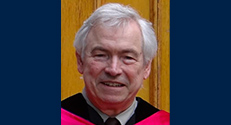Harvey Prize Recipient Announced
The Technion will award the prestigious Harvey Prize to Professor James R. Rice of Harvard University
The Harvey Prize in the Science and Technology category will be awarded to Professor James R. Rice of Harvard University this year. Prof. Rice was chosen for the Technion’s most prestigious award for his fundamental and long-standing contributions to the fields of mechanics of materials and geophysics, particularly for the development of the J-integral and for his leadership, which has broadened the understanding of friction and earthquakes.
Prof. Rice was born on December 3, 1940, in Frederick, Md. He studied at a Catholic school that recruited science and math teachers from the nearby army base. These teachers inspired his love of engineering and science.
In 1958 Prof. Rice began studying at Lehigh University in Bethlehem, Penn., and within just six years he completed three consecutive degrees in Mechanical Engineering and Applied Mechanics. He went on for a postdoc at Brown University, where he began working in 1964. In 1981, he accepted a position at Harvard University, where he serves as the Mallinckrodt Professor of Engineering Sciences and Geophysics.
Prof. Rice has won numerous awards, including the Timoshenko Medal and the ASME (American Society of Mechanical Engineers) Medal, and was elected as a foreign member of the Royal Society of London, as well as to the U.S. National Academy of Engineering and the U.S. National Academy of Science. In honor of his contributions to the engineering sciences, the Society of Engineering Science established the James R. Rice Medal in 2015. He received an honorary doctorate from the Technion in 2005.
Prof. Rice is an expert in solid and fluid mechanics, i.e. stress analysis, deformation, fracture and flow – applied to seismology, tectonophysics and surface geological processes. He focuses on theoretical mechanics in earth and environmental science, including earthquake source processes (research carried out together with his wife, Dr. Renata Dmowska), fault and crack dynamics, tsunami and landslides. One of his greatest achievements, which is also noted by the Harvey Prize Council, is the J-integral, which has become a standard in fracture mechanics, to analyze the crack-tip fields and the crack’s propensity to propagate (fracture). He named this particular integral the “J-integral”, with the uppercase letter “J” coinciding with his nickname “Big Jim,” respectfully used by his students – but the “J” also being a standard notation for energy fluxes in solids, in studies he pursued in the same area with senior Brown Univ. colleagues such as Daniel C. Drucker, Joseph Kestin and also with Rodney Hill at Cambridge Univ., UK.
The $75,000 Harvey Prize, established in 1971 by Leo Harvey (1887-1973), is awarded by the Technion each year for outstanding achievements in science and technology, human health, and significant contributions to mankind. Over the years the Harvey Prize has become a predictor of the Nobel Prize, with more than 30% of Harvey laureates ultimately receiving the Nobel. Three of them – Prof. Emmanuelle Charpentier, Prof. Jennifer Doudna, and Prof. Reinhard Genzel – won the Nobel Prize in 2020.



